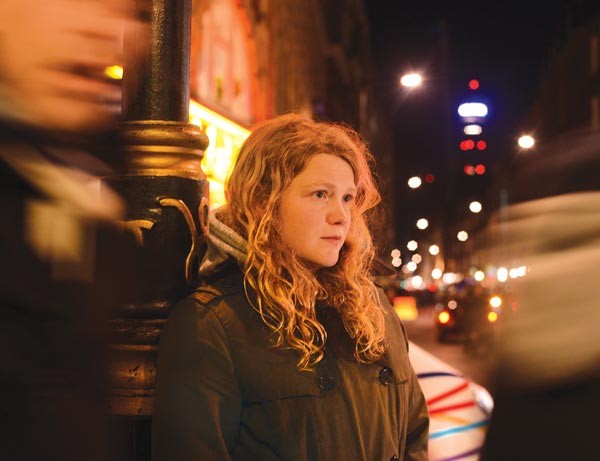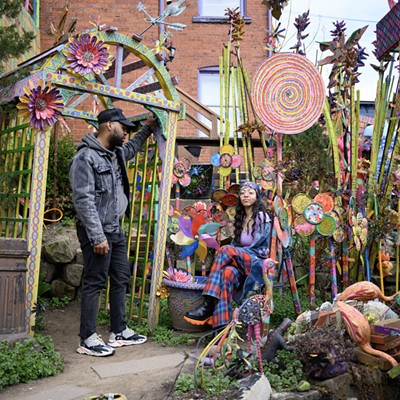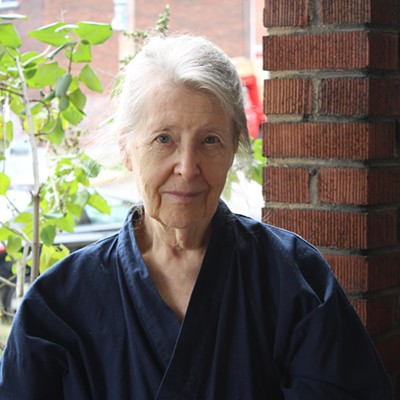There's one way to describe Kate Tempest, which is as a Ted Hughes Award-winning poet, rapper, playwright and novelist who was shortlisted for the Mercury Prize for her debut album Everybody Down.
This way is complex, yet too simple. It buries the truth that first and foremost, Kate Tempest is a storyteller.
Fresh off of being selected as one of 2014's Next Generation Poets — an honor bestowed just once each decade — and a New York Times profile that quotes Billy Bragg describing her performances as "incendiary," Tempest is in the midst of her first U.S. tour to support Everybody Down. A narrative in 12 chapter-songs about the characters of Becky, Harry and Pete as they muck through their recession-era existence in modern-day London, Everybody Down is written and performed by Tempest, and produced by Dan Carey, who's worked with Bat for Lashes and Yeasayer. Tempest, no surprise, is transforming her album into a novel, to be released next year.
"I know that it's a hard listen, and I know that it's quite demanding. At first when we were trying to get a record deal with it, people were like, ‘It's cool but nobody's going to want to listen to it, it's ridiculous, it's too complicated, there are too many words, it's too hard,'" says Tempest. "And actually what I found is that people have been really blown away by having this opportunity to go in, to build, and to be asked for their attention."
Born Kate Esther Calvert, Tempest — who is not yet 30 — grew up in South London as a "kind of weird tomboy, chubby, gay kid," she says. She was a bit of a troublemaker, but scoring a record-store job at age 14 and enrolling at the BRIT School for Performing Arts and Technology (where Adele, Amy Winehouse and Ed Sheeran also studied) helped ground her. She started rapping at 16, got a lit degree from Goldsmiths College in London, then went off performing and publishing in any and all forms, inspired by the artists with whom she found kinship, including E.L. Doctorow, Don DeLillo, Lauryn Hill and the Wu-Tang Clan.
"I live in a constant flux of absolute excitement and joy and creative fervor to have an idea and try to get myself to the place where I can make the idea a reality," says Tempest. "Obviously I have a little doubt, sure, but the thing that I have is this unshakable conviction and this absolute passion and belief in trying to say more, trying to make myself better, more able to do this thing I was born to do."
Tempest engages in conversation like lines of verse: repetition, the rule of three, a rapid cadence that upticks at the end of a flow — followed by an "innit?" or "d'you understand what I'm saying?" for emphasis and just to check in. A seen-it-all drawl that might mug you on the Tube, then buy you a pint and lend an ear to your tears. She wants to hear your story, even more than she wants to tell hers.
For Tempest, the youngest of five kids with a laborer dad who worked his way through law school, storytelling is "how we kept each other safe, it's how we keep each other together."
"I feel like we, as human beings, the way we organize ourselves, our moralities, or communities, is through narratives, stories, fictions we believe in," says Tempest. "Like, the organizing principle of any community is the stories that we tell each other about who we want to be, who we don't want to be. It's how we understand ourselves and our place in the world. It's the absolute bedrock of what makes us human. It's just part of life, innit?"
Tempest, a cherub-faced white woman with a mess of red-blond curls, is often compared to the Streets' Mike Skinner. But beyond the accent, she evokes the thrillingly genre-smashing poetics of Kendrick Lamar, or the story-driven folk tradition currently embodied by Laura Marling.
What is it about her art that escapes accusations of tone-deaf cultural appropriation that tend to plague white rappers? Tempest may be the only rapper who'd respond to a question about Iggy Azalea with a quote from William Blake: "I take my influences and I acknowledge them. William Blake says that if you don't acknowledge your influence, you're only holding a candle to the sunshine."
"The way I respond to everything hip hop taught me is by being me, not trying to be a ‘rapper'," says Tempest. "So judge me by my work, by the content of my character and what I do. I think it's a luxury that's been afforded to men, but I think women are just starting to be able to demand that kind of attention. Like, stop looking at me and listen to me. Listen to what I'm saying. We've got a lot to say and we've been saying it many different ways for a long time."














